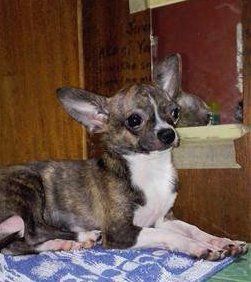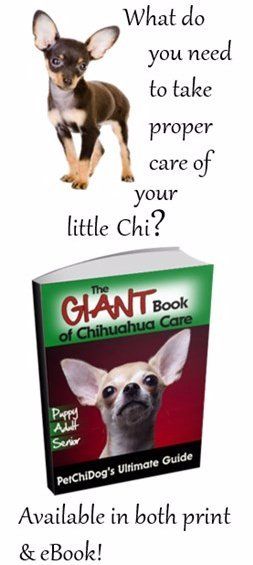When a Chihuahua Eats Grass
Overview
When a Chihuahua puppy or dog keeps eating grass, this can lead to all sorts of issues such as gagging, coughing, throwing up and even nutritional deficiencies. And it can lead to issues that you’d never think would be related; such as being damaging to a Chihuahua’s teeth via an ingredient found in grass.
Owners don’t want their dogs to munch on grass and it certainly doesn’t provide that a high quality food can, so why do dogs do this?
This is a question that’s had veterinarians theorizing answers forever. Some say that dogs eat grass on purpose, others say that it’s done instinctively to correct an existing issue (like upset stomach). However, one thing is clear, eating grass can be very detrimental.
This section will cover:
- Why eating grass is not good for dogs
- Myths about why this is done
- New studies that point to the real reasons for this behavior
- Steps you can take to stop your Chihuahua from eating grass
Why Eating Grass can be Detrimental
Technically, grass typically found in your yard is edible and is not toxic in and of itself, however this does not mean that your Chihuahua should eat it. There are many issues that can develop from this, including:
1. Digestive upset, distress
– Grass contains cellulose fiber is notoriously difficult to dogs to digest. Some animals that graze on grass have completely different stomachs than dogs (cows have a stomach with 4 different chambers). Others like sheep and horses have microbes in their stomachs that break down the grass.
Therefore, when a Chihuahua eats grass, as it passes through the intestines, it can cause discomfort and other issues.
2. Vomiting
– We’ll get into the details of this ahead, however eating grass may lead to
vomiting. When a dog vomits, vital fluids are lost. Even just a 1% loss can lead to mild dehydration and a 5% loss is considered quite serious.
When you have a tiny toy breed like the Chihuahua, any vomiting at all can lead to lethargy, trouble focusing and even hypoglycemia. And in a vicious circle, hypoglycemia can cause vomiting.
3. Ingestion of chemicals
– The grass itself may not be toxic, however such elements as weed killer, pesticides and fertilizer can be extremely poisonous and even fatal. Even if you do not use these things on your own lawn, if a Chihuahua gets into the habit of always eating grass in the yard, he may very well do this when out at the park and other outdoor places just as along his walking route where these chemicals may be used.
An important element to keep in mind is that you will not always be aware if grass has been treated. Many city municipal services spray public grassy areas; this may be done to prevent weeds from growing or to help control insect populations. A sign is often placed right after this is done, however once those signs are removed, the toxins can remain for weeks and often even months.
Insecticides such as carbamates or organophosphates are the most dangerous, with toxic ingestion having the signs of: Drooling, vomiting, diarrhea, excessive eye tearing, severe lethargy and if not treated, possible collapse.
It should be noted that breathing in yard chemicals or coming into contact with them can lead to an array of symptoms such as breathing difficulties, fever, eye pain, cramping and/or swelling of the abdomen, rapid heartbeat, dizziness and/or trouble with vision. Long term effects can include health issues
such as liver or kidney damage and/or neurological problems.

Cholo
Photo courtesy of Lydia Cuevas
4. Tooth decay
– The Chihuahua breed is already quite prone to tooth decay; this is a reason why regular at-home dental care
is highly recommended. And if a Chihuahua regularly munches on grass, this can have a terrible impact on his teeth. Grass contains a lot of silica, which is a highly abrasive compound that erodes tooth enamel. How do cows get away with it? Grazing animals have teeth that are adapted to continually grow, replacing the worn tooth surfaces quickly; not so with canines.
If a Chihuahua were to routinely eat grass, during mastication (the process by which food is chewed, crushed and ground by the teeth, this would lead to a quick wearing down of the enamel. In turn, decay will occur at a much higher rate, often leading to eventual tooth loss.
5. Nutritional deficiencies
– As you know, in regard to Chihuahua calorie needs, this breed does not eat a lot of food to begin with. Puppies only need about 55 calories per pound of body weight; adults need approximately 40 (this number can vary by 20% depending on health, individual metabolism and activity level). So, what a Chihuahua eats should always be of super high quality; if only a bit of food is going to be consumed, it should be the best available. Yet, when a Chihuahua eats grass, he is filling up on something that offers very little (remember that the grass is not digested), and this takes away the opportunity to eat something of nutritional value.
6. Ingestion toxic weeds and plants
- If your yard is free of weeds or only has a few dandelions (these are not toxic), you don’t have to worry about this. But, there are over 700 outside plants that are poisonous or toxic to pets.
7. Bugs
– A huge percentage of stinging insects make their nests under the ground or at ground level. This includes many types of bees, hornets and wasps. Another concern is fire ants. If a Chihuahua is poking around at the grass and putting his mouth down to eat at it, riling up venomous insects is always a concern. If a Chihuahua is stung, the two main concerns are allergic reaction or toxic overload (with multiple stings).
Summary
- So, as you can see there are quite a few reasons why a Chihuahua should not be allowed to eat grass. In regard to benefits, there are none.
Why Dogs Ingest Grass
Here’s the thing about quite a few topics that you may read about including the issue of dogs eating grass: When something is a bit of a mystery and no one of authority really knows the exact answer, some assumptions and ‘best guesses’ will be made.
As soon as that is done, the next few people who wish to discuss the topic will go off of what they have read (information that is not proven to be true) and will essentially copy it. Now you have double the info that is not based in fact.
Jump ahead several years and you then have hundreds of articles that all say the same thing.
And in many cases, people will believe what they read regardless of how factual it is as long as enough sources say it to be true. So, you may be surprised to know that if a Chihuahua is eating grass, this may not be due to the two most commonly listed reasons: trying to induce vomiting and the body needing to ingest ‘greens’.
This is not to say that these cannot be the reasons, however it is less common than previously thought.
Studies Disproving the ‘Eating Grass to Induce Vomiting’ Theory
– It is true that the texture of grass and edges of the blades irritate a dog’s stomach, which triggers the body to expel stomach contents. However, it is not necessarily true that dogs know this and seek out grass for this purpose.
First, let’s look to a study done by the University of California, Davis on canine grass consumption, as summarized in Psychology Today. They first sought out 25 veterinary students who had pets that routinely ingested grasses. Of those, only 8% attested that their dog vomited after ingesting grass. The next step was to poll 47 dog owners. Most of them, 79%, stated that their dogs ate grass.
From this group, only 6% of the dogs showed any signs of wanting to induce vomiting (signs of stomach distress) beforehand and only 12% of the dogs actually vomited afterward. With signs pointing to other reasons for a dog eating grass, they continued on. Next, they polled 1571 dog owners. The majority did have dogs that ate grass, 68%. And again, the ‘eat grass to vomit’ theory was disproved. Only 8% of dogs showed signs of needing/wanting to throw up and only 30% actually did.
Disproving the ‘Eating Grass to Get Greens’ Theory
– Some guess that dogs seek out grass because their bodies are craving green vegetables. There are a couple of things wrong with this train of thought. First, while grass may be the color green, it is far from being a vegetable. As discussed earlier, it can’t even be properly digested. On the other hand, real vegetables contain lots of great nutrients such as Vitamins A, B6, C and K. Many have iron and magnesium as well. In addition, if a dog ate grass as a food source, it directly contradicts theory #1 that they do it to throw up.
The More Realistic Reasons a Chihuahua Eats Grass
Now that we can be fairly sure that only a very small number of dogs eat grass to induce vomiting or that they are craving vegetables, let’s look at the actual reasons your Chihuahua is doing this.
Hunger along with nutrient deficiency
– How can your Chihuahua be hungry if you feed him all his scheduled meals and even give him snacks throughout the day? The answer lies in the quality of that food. If it holds very little nutritional value, a dog will eat all his meals and gobble down his treats, but will still be hungry.
Inferior foods contain lots of fillers. Fillers are elements added to food to bulk it up in an attempt to make it appear that there is a lot, when in fact the amount of ‘real’ food is just a smaller percentage.
Common fillers found in dog food include corn bran, rice bran, oat hulls, cereal by-products, feathers, soybean hulls, cottonseed hulls, peanut hulls, rice hulls, wheat mill run, citrus pulp, modified corn starch, weed, straw, corn gluten, brewers rice, wheat gluten, soybean meal and rice protein.
These sorts of ingredients pass right through the body as they offer nothing for the body to absorb.
For this reason, a Chihuahua may be hungry anywhere from 20 minutes to 1 hour after a full meal.
What to do:
Reassess what you are feeding your Chihuahua. You’ll want to choose a 4 or 5 star food or home cook for your puppy or dog. We recommend Orijen as our first pick.
Even if you have a great kibble, you can always add some extras like fruits (super packed with vitamins and antioxidants) like blueberries, raspberries and strawberries, vegetables like peas and green beans and some extras like a scrambled egg or a drizzle of fish oil (great for the coat).
Habit/boredom/curiosity
- Dogs are funny creatures; if they have nothing to do, they often resort to a habit even if they do not gain much from doing the action.
It’s not all that uncommon for a Chihuahua to be brought outside and for the owner to then become distracted and then they look over and their Chihuahua is munching away on grass like a cow in a pasture.

Photo courtesy of Juliane Ruff,
Highland Park IL
Additionally, dogs are curious creatures and they use their mouths to figure out what something is. Even if a Chihuahua has no intention of eating grass, if he simply mouths it to figure out ‘what is this?’ and/or ‘is it worth my time to chew on this?’
He may discover that the moist blades or unique texture fit his chewing urges at the time. The next thing you know, he’s eating it. Once a Chihuahua eats grass due to boredom or curiosity, without intervention, it can quickly escalate into a routine habit.
What to do:
Luckily, you are in control over what your Chihuahua does when outside, even if it does not feel like it.
1)
By keeping your Chi on leash and harness and supervising him, you can stop him from any actions that you do not approve of. If you use a harness instead of a collar
(highly recommended to avoid potential neck injury with this breed), you can safely tug on the leash to pull him back before he eats any grass.
2)
When you take your Chihuahua outside for a walk or even just to go to the bathroom, it’s best to keep your dog engaged which will keep him focused on other things and far less likely to eat grass. For bathroom needs, stay close, speak the trigger words of ‘go potty’ and give immediate praise when he is done. When walking, it can really help to work on heeling, which will keep him very occupied and additionally, the use of the harness to control his actions will come in handy.
3)
Whenever you head outside with your Chi, have there be a purpose. If you just want to relax in the yard with your Chihuahua by your side, be sure to bring along a nice supply of chew toys
or provide other distractions such as a kiddie pool or sprinkler on hot summer days.
4)
Never leave your Chihuahua outside unattended. There are a host of dangers if a Chi is left outdoors alone even in an enclosed yard, including possible escape, other dogs finding a way in, hawk attack (this is real), bee attack, ingestion of pebbles and other objects that can cause blockage, ingestion of poisonous plants and stress from isolation (even if the duration is short).
5)
Finally, implementing training can help. This breed tends to crave his owner’s attention and receiving positive or negative feedback can greatly affect a Chihuahua’s behavior. The idea is to teach your Chihuahua that eating grass is not an acceptable behavior and then to offer something that is. If, despite the above guidelines, you find your Chi eating grass, clap your hands while giving a firm ‘No’. This will distract him; though do be sure to find a tone and volume that does not overly startle him.
As soon as he is looking at you, offer praise for not eating it anymore (even though it was you that put a stop to it) and immediately refocus his attention elsewhere. You can offer a toy, a treat or even start to engage him in a game.
Things you may wish to do now:
Become a free PetChiDog Member
- You will be able to receive friendly reminders when we add new pages to the site. You will also be able to suggest a topic for us to write about. * If you are already a Member, just reply to any newsletter with your idea.



